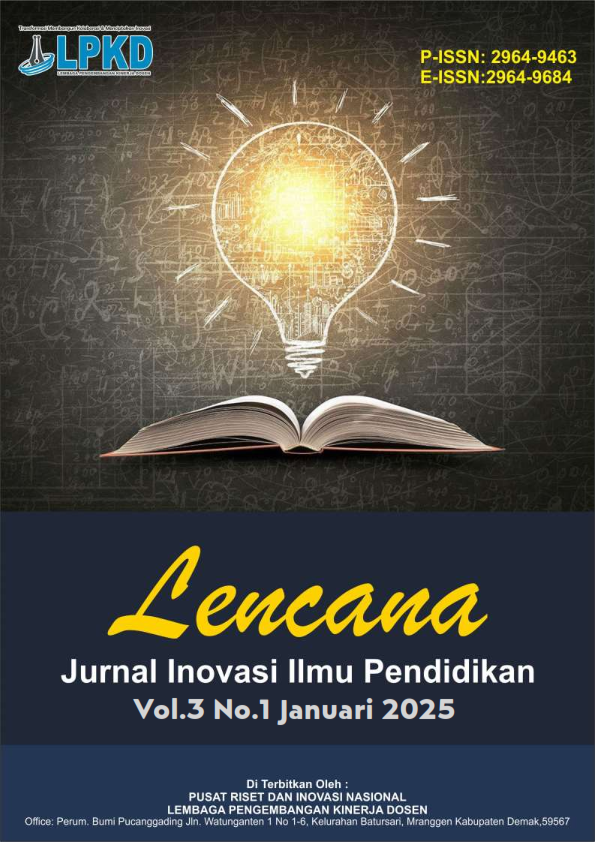Pengaruh Self-Efficacy sebagai Upaya dalam Menangani Stres Akademik pada Siswa Sekolah Dasar
DOI:
https://doi.org/10.55606/lencana.v3i2.5020Keywords:
Self-efficacy, academic, stress, studentsAbstract
Academic stress has become a common problem that needs to be considered carefully. Self-efficacy is a person's belief in understanding their ability to complete academic tasks based on self-confidence about the achievements obtained. Students have relevant corrections between learning outcomes and the academic stress they have. The purpose of this study was to determine the effect of self-efficacy as an effort to deal with academic stress in elementary school students. This study uses a literature review method from previous studies with sources used from Google Scholar and the selected journal years have been published in 2021-2025. The results of this study indicate that self-efficacy has an influence on academic stress in elementary school students and provides insight for educators into optimal psychological and academic development of children.
Downloads
References
Alwijaya, A., & Suyono, H. C. (2023). Peluang implementasi artificial intelligence di perpustakaan: Kajian literatur. Info Bibliotheca: Jurnal Perpustakaan dan Ilmu Informasi, 4(2), 1–17.
Atik, R., & Sulastri, Y. (2020). Efikasi diri dan kecemasan akademik pada siswa SMA. Jurnal Psikologi Terapan, 5(2), 110–119.
Gadzella, B. M. (1991). Student-life stress inventory: Identification of and reactions to stressors. Commerce, TX: Texas A&M University–Commerce.
Ghalif, M. (2024). Perilaku sosial anak dan tantangan pendidikan modern. Yogyakarta: Mitra Ilmu.
Hasanah, N., & Mariyati, L. I. (2023). The relationship between academic stress with academic self-efficacy in vocational high school students. Psikologia: Jurnal Psikologi, 8(1), 12–20.
Himmah, A. F., & Shofiah, N. (2021). Pengaruh self efficacy dan manajemen waktu terhadap stres akademik pada siswa. Journal of Indonesian Psychological Science (JIPS), 1(1), 31–38.
Irwanti, F., & Widodo, S. A. (2018). Efektivitas STAD terhadap hasil belajar matematika ditinjau dari minat belajar siswa kelas VII. Jurnal Pendidikan Matematika Indonesia, 3(1), 45–52.
Karina, P. D., & Damajanti, K. D. (2021). Hubungan antara efikasi diri dengan stres akademik pada siswa di SMA X. Jurnal Penelitian Psikologi, 8(7), 88–96.
Khalil, I. M. (2023). Self-efficacy dengan stres akademik pada siswa kelas olimpiade. Jurnal Sublimapsi, 4(3), 67–75.
Mawarda, Z., & Zikra. (2025). Hubungan self efficacy dengan stres akademik pada siswa SMP Negeri 10 Padang. ALSYS: Jurnal Keislaman dan Ilmu Pendidikan, 5(2), 45–53.
Monica, R., & Sari, D. (2020). Peran dukungan sosial terhadap stres akademik pada remaja. Jurnal Psikologi Remaja, 7(1), 22–30.
Nuriyah, A., & Sumaryanti, I. U. (2017). Studi deskriptif mengenai gambaran stres akademik pada mahasiswa penderita primary insomnia di UPM Olahraga. Prosiding Psikologi, 3(2), 461–467.
Praha, S. A., & Budiyani, K. (2019). Teacher self-efficacy training; Academic self-efficacy and learning achievement of students. InSight, 21(1), 39–49.
Ridwan, M., Suhar, A. M., Ulum, B., & Muhammad, F. (2021). Pentingnya penerapan literature review pada penelitian ilmiah. Jurnal Masohi, 2(1), 42–51.
Wahyuni, S. F., & Dahlia, D. (2020). Hubungan antara efikasi diri akademik dengan prestasi akademik pada siswa SMA di Banda Aceh. Seurune: Jurnal Psikologi Unsyiah, 3(2), 80–100.
Downloads
Published
How to Cite
Issue
Section
License
Copyright (c) 2025 Lencana: Jurnal Inovasi Ilmu Pendidikan

This work is licensed under a Creative Commons Attribution-ShareAlike 4.0 International License.








